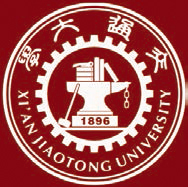
China is a country that almost everyone knows. The country has a long and tangible history. Some cities in China have existed across this ancient timeline. Xi’an is one of those cities; it has been one of the most important cities in the country for centuries. Xi’an Jiaotong University (西安交通大;XJTU)is a famous university not only in Xi’an city but across the entire country. The university is also one of University of Seoul (UOS)’s international exchange partners.
Xi’an Jiaotong University
Xi’an Jiaotong University is one of the oldest universities in China. As implied by the name, the university is located in Xi’an, a major city in western China. XJTU is a public university, which means that it is managed by the government.
XJTU was established in 1896 in Shanghai by the imperial government of the Qing dynasty. During the Second Sino-Japanese War, the university headquarters were set up in Chongqing, and later returned to Shanghai after the war was over. In 1949, the new communist government assumed control of the university (some of the faculty chose to follow the Chinese Nationalist Party, also known as ‘Kuomintang’, to Taiwan, thereby forming an eponymous university, also named National Chiao Tung University, there). In 1959, a portion of the university was moved from Shanghai to Xi’an due to a nationalized strategic plan and was renamed Xi’an Jiaotong University, the name it still goes by today (the remnant university in Shanghai became Shanghai Jiaotong University).
Today, the about 32,000 students are enrolled there and an additional 5,000 people are employed as staff members.
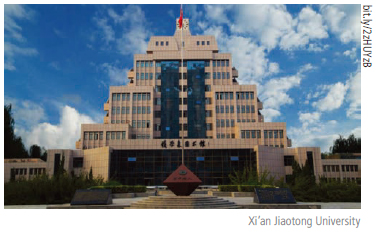
Introducing Xi’an
Xi’an (西安), the capital city of Shaanxi province, is located in Northwest China. It is one of the most important cities in the country, especially in western China where the population is relatively scarce. The total population is about 8.5 million, and it is the most populous city in the province. The climate of the region is temperate with an influence of precipitation from the East Asian Monsoon. It is characterized by hot, humid summers and cold, dry winters.
The city of Xi’an is one of the oldest in China. The capital of the Qin dynasty, the first dynasty to unite the Chinese states, was located near to the modern city of Xi’an. In 202 BC, the Han dynasty founded its capital at what is now Xi’an.During the Tang Dynasty period, the city prospered and became the most populated city in the world at that time. The city got its present name of Xi’an during the Ming dynasty in the 14th century (it was usually called Chang’an before). Due to its long history, there are a lot of historic relics surrounding the city.
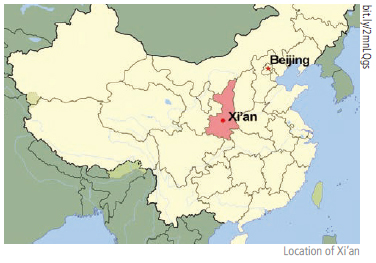
Life at XJTU
Going to another university as an exchange student is all about traveling to a foreign country for an extended time. For students planning to participate in this exchange program, some information and advice will help them to prepare.
Jeong Seung-hyun (Dept. of Mathematics, ’11) is a student of UOS who spent six months, from February to July, at XJTU in 2017. Jeong has some stories to share:
Housing
“Since it is a prestigious university, the atmosphere is quite academic,” Jeong said. “The dormitory was very convenient, equipped with a personal bed and desk,” He explained. Jeong said that life inside the campus was quite convenient. “You can find most amenities inside the campus. however, the campus itself was too large for me and I had to get around with a bicycle. Using bicycles was convenient for me but some people might prefer walking” explained Jeong. He also added that supermarkets and the night market outside the campus were next to the dormitory.
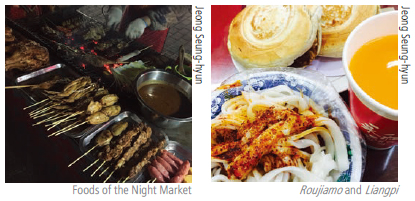
Food
“The local food is pretty greasy, whatever it is,” Jeong recalls, “I personally liked the green spinach noodle. It is cheap and delicious.” He also introduced me to some local specialties during the interview. Roujiamo is a food which is simply a piece of meat between two slices of bread. “Roujiamo was warm, sweet, and salty. It goes well with liangpi (a noodle like dish) and bingfeng (a local soda pop brand),” Jeong said. “Biangbiangmian (a noodle dish) and yangroupaomo (a stew dish with mutton) are local specialties, but I personally did not like them,” He added. He also explained that you can enjoy several foods at the night market, such as fried rice and noodles.
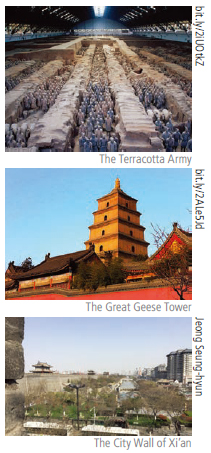
Activities
“Joining clubs is a good way to make local friends. In my case, I joined the piano club,” Jeong said. He added that performances by music related clubs (like the piano club) were sometimes held, influencing the academic atmosphere of the university.
Besides joining clubs, Jeong also explained that there are many places to visit in the city of Xi’an. As Xi’an has existed as a major city since ancient times, there are many historical sites around the city. The old city walls are well preserved. The Great Geese Tower is one famous city landmark. The famous Mausoleum of the First Emperor and his Terracotta Army is located in Xi’an, too. People interested in history would want to visit the Huaqing Pools. Mount Hua, located 120km east of Xi’an, is famous for its beautiful scenery. Small night markets provide a lot to see and will allow you the chance experience local Chinese culture. These are only the tip of an iceberg considering the numerous and widespread relics located everywhere around the city.
“Knowing about the place you are visiting adds to the fun,” Jeong advised. “Also keep in mind that bringing a local student ID card will allow you to get discounts in most places,” He added.
Jeong noted that visiting neighboring regions were also an interesting experience. Since Xi’an is quite close to the center of China, there are new places to visit in all directions. “Shanhai Pass is to the east, Urumqi is to the west, and Sichuan and Yunnan are to the south,” Jeong explained.
Things to Prepare
“There are not many things to bring since you can find everything you need there in the local shops,” Jeong said.
“Learning some Chinese could be useful, though not compulsory. It is possibleto pick up Chinese a bit faster in Xi’an,” Jeong advised, “But it is more important to be fluent in English as well because you will end up using English a lot in the beginner Chinese class, especially when talking it with other foreign students.”
“Meeting foreign students in a foreign country gave me an opportunity to learn how different and same foreigners are to us,” Jeong recalled, “It was also a great experience to live in a foreign nation as a foreigner.”
“Living in a foreign country is not like being home. You will face difficulties. You will face misunderstandings. But there is nobody to help you. You have to figure things out and solve it on your own. All of that will raise your self-reliance,” Jeong said, “As you have the chance to visit a foreign country, do not just stay in the dormitory. Explore what lies outside. Wish you a bon voyage. Thank you.”
Shin Gi-sung
sgsparthia97@uos.ac.kr

